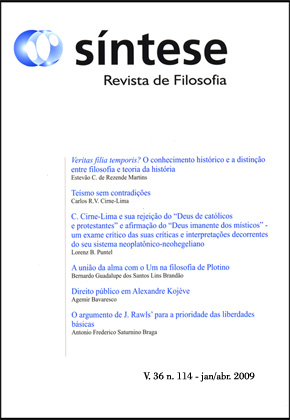DIREITO PÚBLICO EM ALEXANDRE KOJÈVE
DOI:
https://doi.org/10.20911/21769389v36n114p107-130/2009Palavras-chave:
Fenomenologia do Direito, Desejo antropogênico, Direito Público, Direito Intersubjetivo, Filosofia do Direito.Resumo
O Direito Público em Alexandre Kojève, apresentado no trabalho, segundo a sua obra Esboço de uma Fenomenologia do Direito, tem no desejo antropogênico o estatuto básico para a constituição do reconhecimento intersubjetivo que é um processo dialético, baseado na figura do senhor e do escravo da Fenomenologia do Espírito de Hegel. Da luta pelo reconhecimento, portanto, da intersubjetividade, resultará a relação jurídica arbitrada por um terceiro imparcial. Considerando que o modelo metodológico hegelo-kojèviano é pertinente para compreender o fenômeno jurídico, em que medida este método e estatuto teórico-prático contribuem para a superação do Direito moderno, centrado na garantia subjetiva dos direitos fundamentais? Qual é o alcance e o limite do conceito de Direito Público kojèviano na dimensão constitucional e administrativa? A posição kojèviana sobre o Direito público, no seu duplo aspecto, constitucional e administrativo é, eminentemente, política. Considerando a distância entre o contexto sócio-político em que Kojève escreveu seu Esboço, e o posterior debate jusfilosófico constitucionalista do Estado Democrático de Direito, cabe reconhecer a contribuição kojèviana na perspectiva de um Direito intersubjetivo comunitarista.
Abstract: The Public Law in Alexander Kojève which is focused in this work, as stated in Kojève's Sketch of a Law Phenomenology, has in the anthropogenical desire the basic statute for the constitution of the intersubjective recognition which is a dialectical process based in the image of master and servant in Hegel's Phenomenology of Spirit. From the fight for recognition, therefore from the intersubjectivity, the juridical relation mediated by an impartial third will overcome. Taking into account that the methodological hegelo-kojèvian model is appropriate for understanding the juridical model, in what measure this method and theoretical and practical statutes contribute towards the overcoming of the modern Law, moving forward to a communitarist intersubjective Law? Which are the range and the limit of the concept of Kojève's Public Law in the constitutional and administrative dimension? Kojève's position on the public Law, in its double aspect, constitutional and administrative, is prominently political. Considering the distance between the social and political contexts in which Kojève wrote his Sketch, and the posterior constitutionalist jusphilosophic debate of the Law Democratic State, it is worth recognizing Kojève's contribution in the possibility of a communitarist intersubjective Law.


















